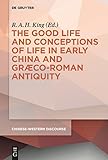The Good Life and Conceptions of Life in Early China and Graeco-Roman Antiquity / ed. by R.A.H. King.
Material type: TextSeries: Chinese-Western Discourse ; 3Publisher: Berlin ; Boston : De Gruyter, [2015]Copyright date: ©2015Description: 1 online resource (402 p.)Content type:
TextSeries: Chinese-Western Discourse ; 3Publisher: Berlin ; Boston : De Gruyter, [2015]Copyright date: ©2015Description: 1 online resource (402 p.)Content type: - 9783110309928
- 9783110382969
- 9783110310115
- 170.93 23
- BJ101 .G66 2015
- online - DeGruyter
- Issued also in print.
| Item type | Current library | Call number | URL | Status | Notes | Barcode | |
|---|---|---|---|---|---|---|---|
 eBook
eBook
|
Biblioteca "Angelicum" Pont. Univ. S.Tommaso d'Aquino Nuvola online | online - DeGruyter (Browse shelf(Opens below)) | Online access | Not for loan (Accesso limitato) | Accesso per gli utenti autorizzati / Access for authorized users | (dgr)9783110310115 |
Frontmatter -- Acknowledgements -- Table of Contents -- I. Methods -- Introduction -- Models for living in ancient Greece and China -- On Comparing Ancient Chinese and Greek Ethics: The tertium comparationis as Tool of Analysis and Evaluation -- II. China -- The Consciousness of the Dead as a Philosophical Problem in Ancient China -- The Ideas of Human Nature in Early China -- Cosmic Life and Human Life in the “Book of Changes” -- Good Fortune and Bliss in Early China -- Bing-distress in the Zuo zhuan: the not-so-good-life, the social self and moral sentiment among persons of rank in Warring States China -- Pleasures and Delights, Sustaining and Consuming -- III. Greece and Rome -- Is the Concept of the Mind Parochial? -- Taking Thoughts about Life seriously -- Filial Piety in Plato -- The Good Life for Plato’s Tripartite Soul -- Good counsel and the role of logos for human excellence -- Hedonê in the Poets and Epicurus -- IV. Comparisons -- Autonomy, Fate, Divination and the Good Life -- Mencius and the Stoics – tui and oikeiôsis -- The Role and Pursuit of the Virtue of Equanimity in Ancient China and Greece -- Index locorum -- General index of subjects
restricted access online access with authorization star
http://purl.org/coar/access_right/c_16ec
Chinese and Greek ethics remain influential in modern philosophy, yet it is unclear how they can be compared to one another. This volume, following its predecssor 'How should one live?' (DeGruyter 2011), is a contribution to comparative ethics, loosely centered on the concepts of life and the good life. Methods of comparing ethics are treated in three introductory chapters (R.A.H.King, Ralph Weber, G.E.R. Lloyd), followed by chapters on core issues in each of the traditions: human nature (David Wong, Guo Yi), ghosts (Paul Goldin), happiness (Christoph Harbsmeier), pleasure (Michael Nylan), qi (Elisabeth Hsu & Zhang Ruqing), cosmic life and individual life (Dennis Schilling), the concept of mind (William Charlton), knowledge and happiness (Jörg Hardy), filial piety (Richard Stalley), the soul (Hua-kuei Ho), and deliberation (Thomas Buchheim). The volume closes with three essays in comparison - Mencius and the Stoics (R.A.H. King), equanimity (Lee Yearley), autonomy and the good life (Lisa Raphals). An index locorum each for Chinese and Greco-Roman authors, and a general index complete the volume.
Issued also in print.
Mode of access: Internet via World Wide Web.
In English.
Description based on online resource; title from PDF title page (publisher's Web site, viewed 28. Feb 2023)


